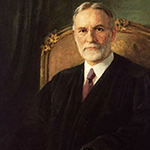
George Sutherland (1922-1938)
Lived from 1862 to 1942.
Early Life and Legal Career
George Sutherland was born in Stony Stratford, Buckinghamshire, England. Sutherland and his family moved to Springville, Utah in 1863, before relocating once again to Montana. He graduated from Brigham Young Academy in 1881, before moving to Michigan to enroll in the University of Michigan Law School, where he was a student of Thomas M. Cooley. Sutherland left the school before earning his law degree, but was nonetheless admitted to the Michigan bar.
After passing the bar, Sutherland moved to Utah where he began to practice law. In 1900, he was nominated as the Republican party’s candidate for Utah’s seat in the U.S. House of Representatives. He won in a narrow victory, but only served one term after deciding to successfully pursue a seat on the Senate. Sutherland is credited with having introduced the Nineteenth Amendment, which forbid the government from discriminating against voters on the basis of sex.
Appointment to the Supreme Court
President Warren G. Harding appointed Sutherland to the Supreme Court of the United States on September 5, 1922. During his time on the Court, Sutherland is perhaps best remembered for consistently striking down President Roosevelt’s “New Deal” legislation until retiring in 1938. Sutherland authored several important decisions while on the bench. One of those decisions, Powell v. Alabama, overturned a conviction in the Scottsboro Boys Case, as the defendant, Ozie Powell, had been deprived of his right to counsel. Additionally, in U.S. v. Curtis-Wright Export Corp., Sutherland wrote the majority decision, which gave the president wide powers in conducting foreign affairs.
Death
Sutherland died of a heart attack on July 17, 1942. He was interred at Abbey Mausoleum in Arlington County, Virginia. In 1958, his remains were removed and reburied at Cedar Hill Cemetery near Suitland, Maryland.
Notable Cases
Powell v. Alabama (1932)
U.S. v. Curtis-Wright Export Corp. (1936)








